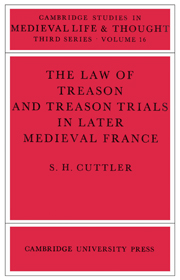Book contents
- Frontmatter
- Contents
- Dedication
- Preface
- Abbreviations
- Introduction
- 1 THE CONCEPT OF TREASON IN LATER MEDIEVAL FRANCE: LEGISTS, ‘COUTUMIERS’ AND TREATISE-WRITERS
- 2 THE CRIMES OF TREASON
- 3 JURISDICTION
- 4 PROCEDURE AND THE TRIAL OF PEERS
- 5 PUNISHMENT, FORFEITURE AND PARDON
- 6 TREASON AND THE CROWN 1328–1356
- 7 TREASON AND THE CROWN 1356–1380
- 8 TREASON AND THE CROWN 1380–1422
- 9 TREASON AND THE CROWN 1422–1461
- 10 TREASON AND THE CROWN 1461–1494
- Conclusion
- Bibliography
- Index
8 - TREASON AND THE CROWN 1380–1422
Published online by Cambridge University Press: 13 October 2009
- Frontmatter
- Contents
- Dedication
- Preface
- Abbreviations
- Introduction
- 1 THE CONCEPT OF TREASON IN LATER MEDIEVAL FRANCE: LEGISTS, ‘COUTUMIERS’ AND TREATISE-WRITERS
- 2 THE CRIMES OF TREASON
- 3 JURISDICTION
- 4 PROCEDURE AND THE TRIAL OF PEERS
- 5 PUNISHMENT, FORFEITURE AND PARDON
- 6 TREASON AND THE CROWN 1328–1356
- 7 TREASON AND THE CROWN 1356–1380
- 8 TREASON AND THE CROWN 1380–1422
- 9 TREASON AND THE CROWN 1422–1461
- 10 TREASON AND THE CROWN 1461–1494
- Conclusion
- Bibliography
- Index
Summary
The last years of Charles V's reign and the first years of Charles VI's were marked by urban rebellions that were more often than not punished severely under the law of treason, and at considerable profit to the crown. In late 1379, after the imposition of a hearth tax of 12 francs, violence erupted at Nîmes, Le Puy, Alais, Montpellier, and other towns in the south. At Montpellier a contemporary source estimated that some eighty royal officers – surely an inflated figure – were murdered on 25 October. Although Louis d'Anjou, the king's lieutenant, treated Nîmes leniently, he was much more severe with Montpellier, where he arrived on 20 January 1380. On 24 January he pronounced a brutal sentence that was distinguished by its clear references to the Roman law of treason. ‘Because there is no doubt that they have committed the crime of lese-majesty and have even committed a crime against the ins gentium’ his decree stated, 600 burgesses were to be executed, with confiscation of their property, ‘as the lex Julia maiestatis provides’. Anjou's judicial sentence then quoted verbatim from the passage in the lex Quisquis on the disinheritance of traitors' children and their condemnation to a life of poverty and misery. The town as a whole was to pay a fine of 600,000 francs, and the commune was to be suppressed. On the following day, however, Anjou mitigated the sentence: only the ringleaders were to be executed and their property confiscated; the fine was revoked, but 130,000 francs still had to be paid to the duke ‘for his expenses’. The political structure of the commune was left more or less as it was.
- Type
- Chapter
- Information
- The Law of Treason and Treason Trials in Later Medieval France , pp. 181 - 194Publisher: Cambridge University PressPrint publication year: 1982

